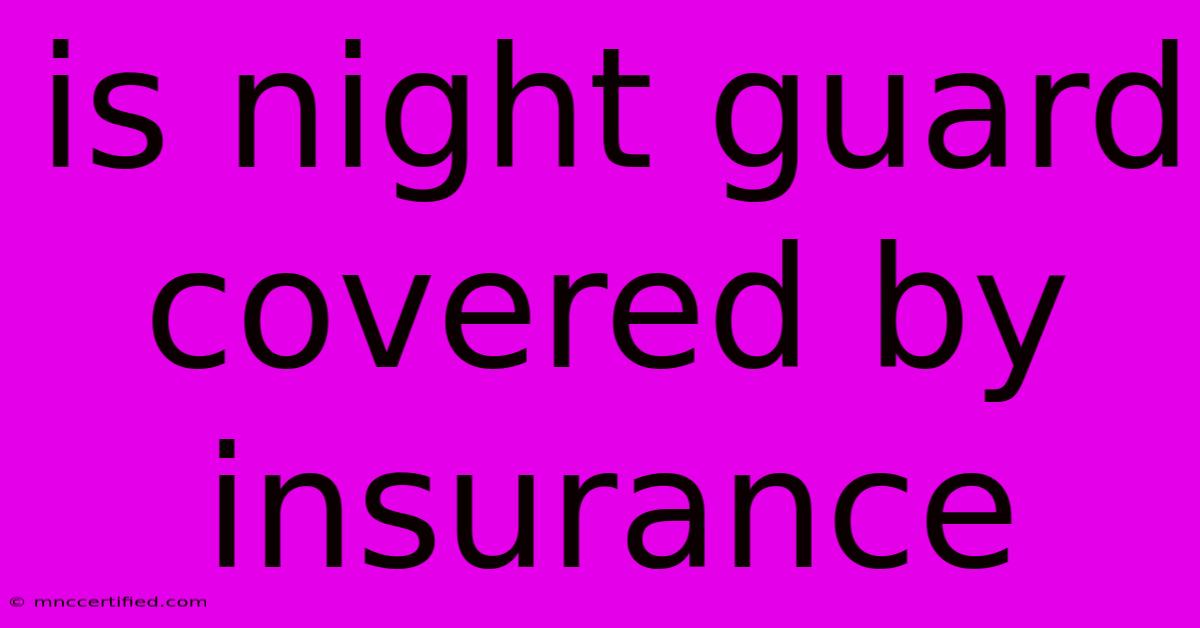Is Night Guard Covered By Insurance

Table of Contents
Is a Night Guard Covered by Dental Insurance? A Comprehensive Guide
Are you struggling with teeth grinding or clenching at night? You're not alone. Millions of people experience bruxism, which can lead to serious dental problems if left untreated. A night guard is a common solution, but many wonder: is a night guard covered by dental insurance?
The answer isn't always simple. Coverage for night guards varies significantly depending on your specific insurance plan, the reason for needing the night guard, and even your location.
Understanding Dental Insurance Coverage
Dental insurance plans typically fall into two categories: Preventative and Diagnostic and Major Services.
- Preventative and Diagnostic coverage usually includes cleanings, exams, and X-rays. These services are often covered in full or at a higher percentage.
- Major Services encompass more complex procedures like fillings, crowns, and dentures. These are generally covered at a lower percentage, with a higher out-of-pocket cost.
Night Guard Coverage: The Factors That Matter
Here's a breakdown of factors that influence whether your dental insurance will cover a night guard:
- Reason for the Night Guard:
- Bruxism (Teeth Grinding): Many insurance plans cover night guards specifically for bruxism, as it's considered a medically necessary treatment to protect teeth from damage.
- TMJ (Temporomandibular Joint Disorder): If you have TMJ and require a night guard for treatment, your insurance is more likely to cover it.
- Other Reasons: If you need a night guard for a different reason, like a sports injury or a cosmetic purpose, coverage is less likely.
- Insurance Plan:
- Plan Type: Some dental insurance plans include "orthodontic coverage," which could potentially cover night guards. Others might offer a "limited benefit" that only covers a specific amount per year for certain services.
- Deductible and Co-pay: Even if your insurance covers night guards, you may still need to pay a deductible or co-pay.
- Location:
- State Regulations: Some states have specific laws regarding dental insurance coverage for certain treatments, including night guards.
- Dentist Recommendation:
- Diagnosis and Prescription: Your dentist must diagnose the reason for needing a night guard and provide a prescription for it. This helps solidify the medical necessity for the treatment and increases the chances of insurance coverage.
How to Find Out If Your Night Guard is Covered
- Contact your insurance provider: The best way to know for sure is to call your insurance company and ask.
- Review your policy document: Carefully read your policy to understand coverage limitations and any specific criteria for night guard coverage.
- Ask your dentist: Your dentist is familiar with insurance procedures and can guide you regarding coverage.
Tips for Maximizing Coverage
- Choose a dentist in your insurance network: This can save you money on both the cost of the night guard and any other related treatments.
- Ask for different pricing options: Your dentist may offer different types of night guards at varying costs.
- Explore alternatives: If your insurance doesn't cover a night guard, your dentist may suggest alternative treatments, like Botox injections or stress management techniques.
Conclusion
Whether or not your night guard is covered by insurance depends on many factors. Knowing your insurance plan and the reason for needing a night guard is crucial. Don't hesitate to reach out to your insurance provider or your dentist for more information about coverage and potential cost savings.

Thank you for visiting our website wich cover about Is Night Guard Covered By Insurance. We hope the information provided has been useful to you. Feel free to contact us if you have any questions or need further assistance. See you next time and dont miss to bookmark.
Featured Posts
-
Full Houses Dave Coulier Battles Cancer
Nov 14, 2024
-
Blumenthal Worried By The Bear Show
Nov 14, 2024
-
Spain Batters By Torrential Rain Evacuations Ordered
Nov 14, 2024
-
Megalopolis Movie Review Hit Or Miss
Nov 14, 2024
-
Trump Announcement Boosts Dogecoin Price
Nov 14, 2024